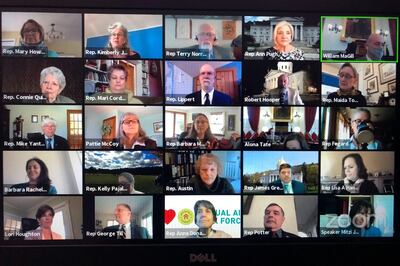Zoom Video saw a huge spike in its first quarter net profit for the three months ending April 30 as its revenue soared on the back of the company adding more customers.
Net profit to shareholders surged to $27 million (Dh99.5m), which was 135-times the $200,000 earned in the same period a year ago. Revenue for the period reached $328.2m – a yearly increase of 169 per cent, the company said.
“We were humbled by the accelerated adoption of the Zoom platform around the globe in the first quarter,” said Eric Yuan, founder and chief executive of the firm.
The platform is being used much more widely during the Covid-19 pandemic as workplaces and schools have been closed in a bid to limit its spread.
“The Covid-19 crisis has driven higher demand for distributed, face-to-face interactions and collaboration using Zoom ... use cases have grown rapidly as people integrated Zoom into their work, learning, and personal lives,” said Mr Yuan.
Zoom said the number of paying customers, with more than 10 employees increased to 265,400 at the end of the first quarter, a quarter-on-quarter rise of 225 per cent.
In its guidance for the second quarter, the company forecast revenue in the range of $495m to $500m, and for the full year it expects sales of between $1.77 billion and $1.8bn. In its last financial year ending January 31, the company made $622.6m in revenue.
The revenue outlook takes into consideration the increasing demand for remote work solutions for businesses, it said.
Zoom shares, which started the year at around $69, closed at $208.08 on Tuesday.
The company said its gross margin narrowed during the quarter as it relied more on third-party cloud providers such as Amazon Web Services to accommodate the growing number of customers.
This led to “more costs” but was crucial to meet the needs of users, said Kelly Steckelberg, Zoom’s chief financial officer, in an earnings call on Tuesday.

“Moving forward, as we build additional capacity in our own data centres, we expect to gain some efficiencies,” said Ms Steckelberg, adding that the company expects to increase capital expenditure for data centre equipment in the next quarters.
In April, the company said the current number of daily meeting participants across Zoom’s paid and free services has surged to 300 million, from about 10 million in December.
However, the number of participants has fallen from its peak in April, but “certainly over the long term, we expect it to grow beyond that 300 million number”, said Ms Steckelberg.
Zoom, which employs 2,800 employees globally, has also announced a one-time bonus worth two weeks’ pay to all of its non-commissioned employees to help them pay for additional costs arising from any disruption to their work due to the coronavirus pandemic.
The video communications platform has been adopted by businesses, schools, universities and by individuals for social purposes, as well as for entertainment and fitness classes.
But the practice of "Zoombombing" – gatecrashing other people's meetings – has presented problems for the company. Other concerns have arisen regarding how the company has shared users' data.
The company, which went public in April 2019, said that the offices of more than 25 attorneys general in the US had raised questions about privacy issues and it is working with the authorities.
Hackers also reportedly put up half a million Zoom logins for sale on the dark web, which were bought by a cyber security intelligence company. Zoom, in response, said it was common for bad actors to test large numbers of already-compromised credentials from other platforms to see if they’ve been reused.








